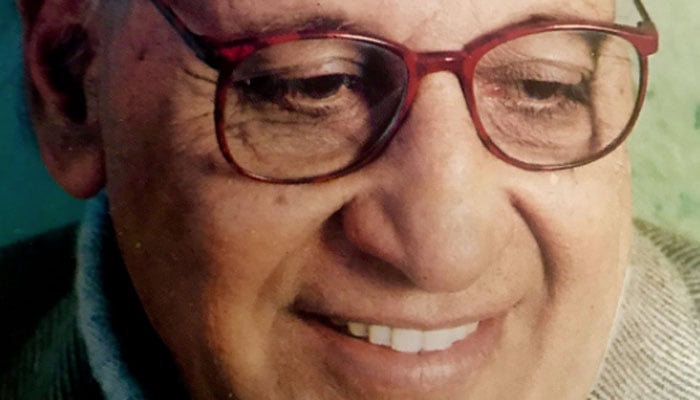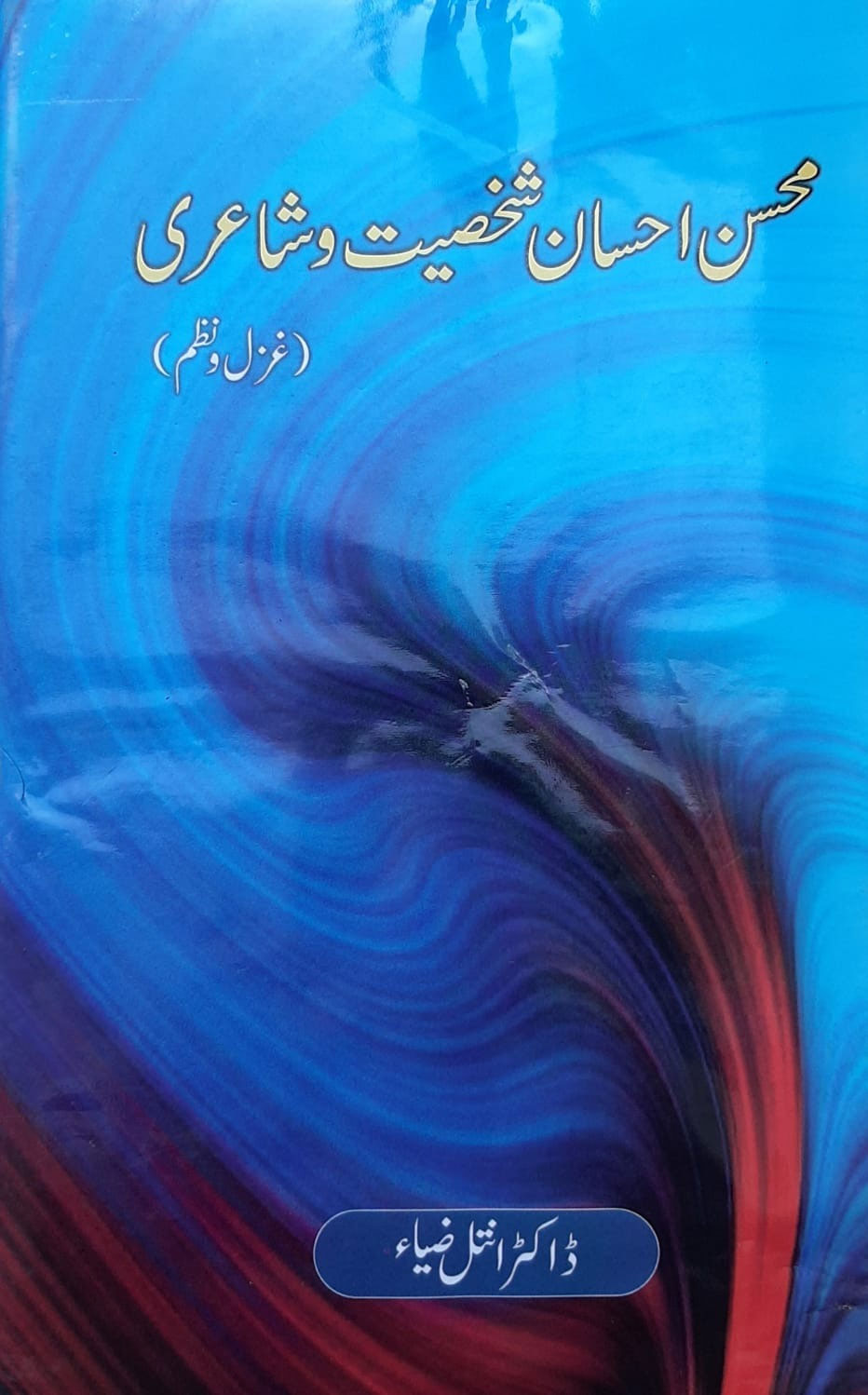Book on Prof Mohsin Ehsan brought out: Publication sheds light on life & work of known Urdu poet from Peshawar
PESHAWAR: A well-researched book on accomplished Urdu poet, late Prof Mohsin Ehsan has hit the market which sheds light on his life and work in greater detail.
Mohsin Ehsan, who was also an eminent academician, hailed from Peshawar city. He was born on October 15, 1932, and passed away on December 22, 2010.
The literatus had 13 publications to his credit. Among them were five poetic collections -- Naa Tamaam, Naa Guzeer, Naa Raseeda, Ajmal-o-Akmal and Mitti Kee Mehkar. Izafa is the translation of his three English dramas into Urdu.
He was honoured with several awards, including the prestigious Presidential Pride of Performance in the year 1999 for his services to literature.
Prof Dr Antal Zia has authored the 233-page publication titled “Mohsin Ehsan Shakhsiat Aur Shairi (Ghazal-o-Nazm). She has dedicated the book to her parents and teachers.
The author has a passion for Urdu literature and has been teaching the subject for the last two decades.
Having taught at various colleges, the writer from Musazai village of Peshawar, is at present Head of the Urdu Department of the Shaheed Benazir Women University, Peshawar.
Prof Dr Izharullah Izhar of the Urdu Department of the Islamia College University has written the foreword to the book which tells all about late Mohsin Ehsan, who had carved out a niche in the Urdu poetry and was a close friend of other internationally known literati, Ahmad Faraz and Khatir Ghaznavi.
“Dr Antal Zia met Mohsin Ehsan to get first-hand knowledge instead of relying on what has been written or said about him. The book speaks of her linguistic awareness, critical thinking and research,” writes Dr Izharullah.
Dr Sohail Ahmad, Urdu Department of the University of Peshawar, has praised the author for spotlighting the varied aspects of the life and personality of Mohsin Ehsan.
“The publication encompasses the life, personality and poetry of Mohsin Ehsan to help readers comprehend his work. It is a good addition to the critical literature of Khyber Pakhtunkhwa,” opines Dr Sohail Ahmad.
Association Professor Nisar Turrabi of the Urdu Department of Al-Hamd Islamic University, Islamabad, says Mohsin Ehsan was a prominent name in Khyber Pakhtunkhwa after Ahmad Faraz who enjoyed both credibility and fame for his diction.
“Dr Antal Zia has introduced to the readers more aspects of the life and poetry of Mohsin Ehsan which had remained hidden from literature-lover thus far,” says Nisar Turabi.
Prof Syed Ghayyur Hussain, a scholar of the Persian language, has praised the writer for bringing to the fore more information about the life and work of Mohsin Ehsan who had a high literary stature.
The book is divided into three chapters. The first part is about the early life of Mohsin Ehsan, his education, employment, marital life, personality, associations with literary organisations and foreign trips.
The readers come to know about Mohsin Ihsan family background who was born as Ihsan Elahi into a Hindko-speaking family of Peshawar at Dhakki Naalbandi, in Qissa Khwani. He had Turkistani ancestry from his father's side while his mother was an Awan.
He was enrolled in Hindus-run Sanatan Dharam High School and National High School (renamed Government High School No 2, Peshawar City after Independence) and Sikhs-managed Khalisa High School (now called Government Frontier College for Women).
Mohsin Ehsan did his Adeeb Fazil (equivalent to FA) and Munshi Fazil (BA) and later Masters in English literature. He became a lecturer at the historic Islamia College Peshawar and retired as head of its English Department.
In the second chapter, the writer has dwelt on the poetry of Mohsin Ehsan, his progressive thoughts and association with literary movements.
She has quoted reputed literary journals and literati such as Farigh Bukhari, Prof Khatir Ghaznavi, Prof Dr Zahoor Ahmad Awan, Amjad Islam Amjad, Prof Mohammad Usman, Dr Muzaffar Abbas, AB Ashraf, Haider Qureshi and Mian Saeed to explain the topic.
The third chapter has discussed expansively the thoughts contained in the sonnets and poems composed by Mohsin Ehsan who also did poetry in his mother language Hindko which was published in a Hindko language journal in 1990.
-
 Ghost's Tobias Forge Makes Big Announcement After Concluding 'Skeletour World' Tour
Ghost's Tobias Forge Makes Big Announcement After Concluding 'Skeletour World' Tour -
 Katherine Short Became Vocal ‘mental Illness’ Advocate Years Before Death
Katherine Short Became Vocal ‘mental Illness’ Advocate Years Before Death -
 SK Hynix Unveils $15 Billion Semiconductor Facility Investment Plan In South Korea
SK Hynix Unveils $15 Billion Semiconductor Facility Investment Plan In South Korea -
 Buckingham Palace Shares Major Update After Meghan Markle, Harry Arrived In Jordan
Buckingham Palace Shares Major Update After Meghan Markle, Harry Arrived In Jordan -
 Demi Lovato Claims Fans Make Mental Health Struggle Easier
Demi Lovato Claims Fans Make Mental Health Struggle Easier -
 King Hospitalized In Spain, Royal Family Confirms
King Hospitalized In Spain, Royal Family Confirms -
 Japan Launches AI Robot Monk To Offer Spiritual Guidance
Japan Launches AI Robot Monk To Offer Spiritual Guidance -
 Japan Plans Missile Deployment Near Taiwan By 2031 Amid Growing Regional Tensions
Japan Plans Missile Deployment Near Taiwan By 2031 Amid Growing Regional Tensions -
 Meghan Markle, Prince Harry Spark Reactions With Latest Announcement
Meghan Markle, Prince Harry Spark Reactions With Latest Announcement -
 Kate Hudson Reflects On Handling Award Season With No Expectations
Kate Hudson Reflects On Handling Award Season With No Expectations -
 6 Celebrities Who Have Been Vocal About Anxiety And 'panic Attacks'
6 Celebrities Who Have Been Vocal About Anxiety And 'panic Attacks' -
 Is This The Future Of Train Travel? Robot Dogs, Drones Are Redefining Public Transit Safety Through China’s New Metro Station Deployment
Is This The Future Of Train Travel? Robot Dogs, Drones Are Redefining Public Transit Safety Through China’s New Metro Station Deployment -
 Sarah Ferguson Seeks Hollywood Backing As Epstein Files Resurface
Sarah Ferguson Seeks Hollywood Backing As Epstein Files Resurface -
 China’s AI Milestone: ByteDance’s Doubao Chatbot Hits 100M Users During Lunar New Year
China’s AI Milestone: ByteDance’s Doubao Chatbot Hits 100M Users During Lunar New Year -
 Think You Know ChatGPT? Here Are 5 AI Levels You’ve Never Seen
Think You Know ChatGPT? Here Are 5 AI Levels You’ve Never Seen -
 Bitcoin Bounces From $62,000 As On-chain Metrics Signal Prolonged Weakness: Here Is Everything To Know
Bitcoin Bounces From $62,000 As On-chain Metrics Signal Prolonged Weakness: Here Is Everything To Know





